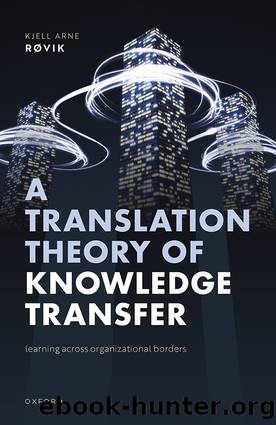A Translation Theory of Knowledge Transfer by Røvik Kjell Arne;

Author:Røvik, Kjell Arne; [Kjell Arne Røvik]
Language: eng
Format: epub
Publisher: Oxford University Press, Incorporated
Published: 2023-02-24T13:47:16+00:00
Calculated radical translations
A radical translation mode can be based on deliberate calculations and decisions. Such decisions are often premised on two slightly different aims and motives: the radical translation can be executed to (a) achieve effective local problem-solving, and (b) to avoid risks of âforeign imports.â
Radical translation to increase local problem-solving capacity. A radical translation can reflect an ambition of effective problem-solving. Major changes to source versions of ideas and practices may be motivated by an aim of developing even more effective and targeted means to handle certain challenges in recipient organizations. Westney (1987) provides an example in her study of the development of the Japanese police system early in the Meiji period 1868â1912. During the Meiji restauration, the police as well as other parts of the Japanese public administration were reformed by systematic attempts to transfer models of institutions and practice from various Western countries to Japan. The search for foreign models was premised on a clear problem definition: the existing police system, which was a heritage from the former Tokugawa regime (1603â1867), was characterized by considerably differentiation of jurisdiction by region and by citizensâ status (one law for noble Samurais, and another for commons). Therefore, the Meiji leaders searched for a model that could secure a uniform treatment of citizens, despite their status and localization. Although parts of the model were based on insights from Germany and England, the Meiji leaders choose the French centralized police system as the overall template to emulate.
However, in the early 1880s, it became clear that the centralized police system imported from France had not solved the unreasonable variations in the regional distribution of police services in Japan. Reports from the midst 1980s documented a negligible police presence in the rural districts, and that the French-inspired system of concentrating police posts in the towns restricted the police to play a reactive rather than a preventive role in rural Japan. This recognition sparked a radical transformation of important parts of the adopted centralized French administrative model. Contrary to centralization, decentralization now became the guiding idea for problem solving. As Westney (1987) showed, this was a radically different strategy. Implemented in the second half of the 1880s, it led to severe changes. From 1886 to 1889, the number of police posts in the country made a jump of 270âpercent. Police stations were established in each county and a new type of base-level police posts (one-man residential posts) was established under each county station.
Radical translation as risk avoidance. Differences between source and recipient organizational contexts is a critical variable that affects chances for successful knowledge transfer (Kedia and Bhagat, 1988; De Long and Fahey, 2000). Important contextual differences often stem from spatial, cultural, political, and institutional distance between source and recipient. The more the source and the target contexts differs in relation to such variables, the higher the chances that the transferred foreign knowledge contains context-specific elements that do not fit with the recipient context. However, recipient organizations can be aware of the risks involved in
Download
This site does not store any files on its server. We only index and link to content provided by other sites. Please contact the content providers to delete copyright contents if any and email us, we'll remove relevant links or contents immediately.
The Brazilian Economy since the Great Financial Crisis of 20072008 by Philip Arestis Carolina Troncoso Baltar & Daniela Magalhães Prates(133790)
International Integration of the Brazilian Economy by Elias C. Grivoyannis(109643)
The Art of Coaching by Elena Aguilar(53185)
Flexible Working by Dale Gemma;(23285)
How to Stop Living Paycheck to Paycheck by Avery Breyer(19718)
The Acquirer's Multiple: How the Billionaire Contrarians of Deep Value Beat the Market by Tobias Carlisle(12308)
Thinking, Fast and Slow by Kahneman Daniel(12253)
The Radium Girls by Kate Moore(12014)
The Art of Thinking Clearly by Rolf Dobelli(10450)
Hit Refresh by Satya Nadella(9125)
The Compound Effect by Darren Hardy(8941)
Tools of Titans by Timothy Ferriss(8363)
Atomic Habits: Tiny Changes, Remarkable Results by James Clear(8323)
Turbulence by E. J. Noyes(8040)
A Court of Wings and Ruin by Sarah J. Maas(7811)
Change Your Questions, Change Your Life by Marilee Adams(7758)
Nudge - Improving Decisions about Health, Wealth, and Happiness by Thaler Sunstein(7690)
How to Be a Bawse: A Guide to Conquering Life by Lilly Singh(7468)
Win Bigly by Scott Adams(7183)
